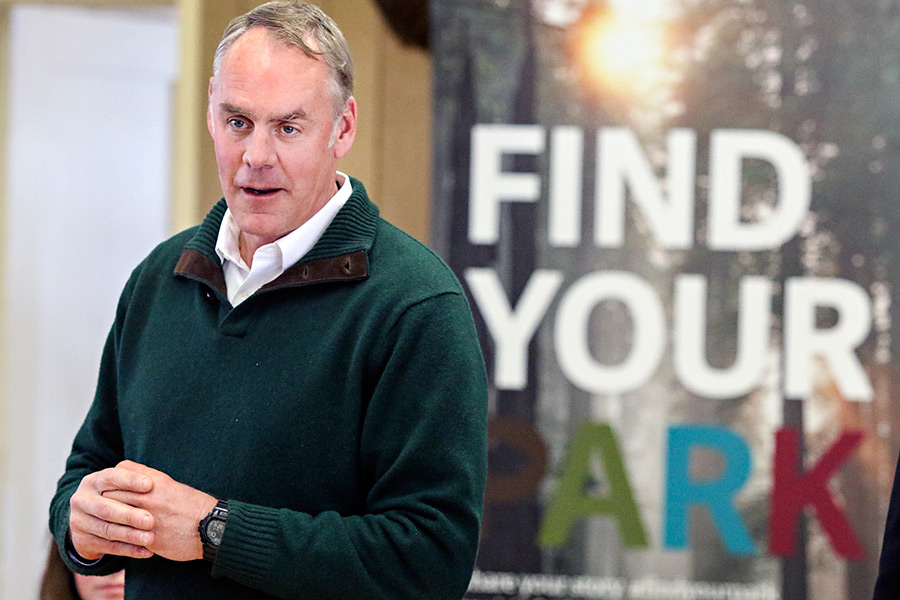Interior Secretary Ryan Zinke is defending the Trump administration’s budget proposal unveiled last week, despite deep cuts it would make to land-management agencies that could have severe consequences in Montana and other western states.
The budget, which is still subject to approval by Congress, carries cuts to the Department of Interior and the Department of Agriculture — agencies that, combined, manage more than 700 million acres of public land.
The Trump administration’s budget would cut Interior funding by about 11 percent, reducing funding to $11.7 billion in fiscal 2018 — about $1.6 billion less annually. The proposal would also eliminate programs that Zinke has previously championed, but which he now says the administration considers unnecessary, duplicative or considers a low priority.
“It was not an easy job. There were difficult decisions that were made,” Zinke said in a May 23 call with reporters. “This budget overall speaks to the core mission of the Department of the Interior. It funds our highest priorities — safety, security, infrastructure.”
After his confirmation in March, Zinke addressed his staffers and said he disagreed with cuts in the budget proposal, vowing to push back.
“I looked at the budget. I’m not happy, but we’re going to fight about it, and I think I’m going to win at the end of the day,” he said at the time, according to reports.
Among the programs Zinke said were redundant are discretionary grants to help reclaim abandoned mine sites, National Heritage areas that Trump administration officials say are more appropriately funded locally and National Wildlife Refuge payments to local governments.
The budget also significantly decreases funding for new major acquisitions of federal land, cutting such appropriations by more than $120 million.
Cuts to the popular and bipartisan Land and Water Conservation Fund total nearly $54 million, an 80 percent cut to this year’s enacted level.
The Land and Water Conservation Fund draws revenue from offshore oil and gas development to boost local projects in the nation’s parks, wildlife refuges, forests, and trails. Advocates, particularly sportsmen, seized on these cuts to hammer the budget proposal.
Zinke said the administration intends to focus on investing in and maintaining existing federal lands. In particular, the proposal would boost money to help address the roughly $11 billion maintenance backlog within the national park system.
Defending the cuts to the land acquisition program, Zinke said, “We need to take care of what we have first.”
“I don’t think we need to buy more land, but take care of what we have first before we buy into more acquisitions,” he said.
A host of influential conservation groups and elected leaders were quick to criticize cuts that provide critical funding for air and water quality, which prop up Montana’s economy and are engrained in its values.
Land Tawney, president and CEO of Backcountry Hunters and Anglers, called the cuts “unprecedented.”
“The administration’s budget starves our public lands of critical funding,” Tawney said. “The cuts they would levy on our natural resource agencies, resource professionals and key programs are unprecedented and far-reaching in scope. Not only would they profoundly diminish our lands and waters, fish and wildlife habitat, and outdoor opportunities; they also would hobble America’s potent outdoors economy — currently $887 billion strong, sustainable and growing.”
Marne Hayes, executive director for Montana’s Outdoors, said the budget would reduce access to public lands, which is bad for tourism and Montana’s outdoor economy.
“This proposal would siphon away important funding from public lands access and recreation programs that fuel our outdoor economy and way of life in Montana,” Hayes said. “We look forward to working with Montana’s delegation to ensure our public lands and outdoor access receive the investments they deserve.”
Democratic U.S. Sen. Jon Tester also panned the budget proposal, saying it irresponsibly provides tax cuts to the wealthy while wasting billions on a border wall.
“We need to reduce wasteful spending and get a handle on our debt, but this budget doesn’t do that — it will hurt Montana farmers and ranchers, cut benefits to America’s veterans, and dismantle public education.”
Democratic Gov. Steve Bullock said the budget was “un-American” and ripped essential services away from Montana families.
